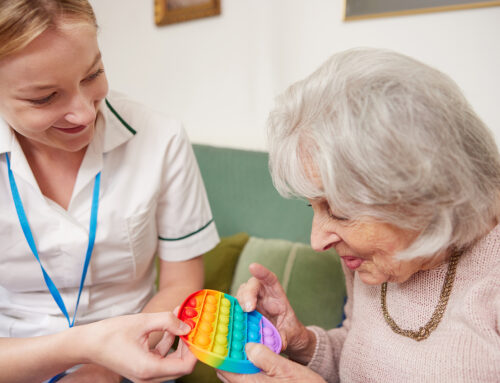Everyone has activities of daily living (ADLs) and instrumental activities of daily living (IADLs) that they need to get through the day. Disability, changing health, and worsening mobility can make it hard to complete these important tasks. When your dad is struggling with daily routines, it’s time to address the benefits of occupational therapy. How does an occupational therapist help your dad complete his ADLs and IADLs? To understand that, you need to understand the differences.
What ADLs and IADLs Entail
ADLs cover seven areas including bathing, continence, dressing/grooming, eating, functional mobility, toileting, and walking. This means:
- Bathing – Able to take a bath or shower and clean the hair and all parts of the body
- Continence – Able to hold the bladder or bowels in time to get to the toilet
- Dressing/Grooming – Able to get dressed, trim nails, brush and floss teeth, brush and style hair, and shave
- Eating – Able to chew and swallow foods and beverages
- Functional Mobility – Able to shift position to prevent pressure sores
- Toileting – Able to use the toilet and clean up after
- Walking/Ambulating- Able to walk around, stand up from a seated position, sit down, and go up and down stairs
Those are essential needs required for your dad’s health and wellness. There are also IADLs, and they are based more on comfort and security and are complex. They include:
- Communications – Calling repair technicians when needed, making medical appointments, using the phone, chat, or email in general
- Finances – Managing finances including paying bills, depositing checks, and transferring money from one account to the next
- Home Maintenance – Upkeep of the home through yard care, cleaning, and repairs
- Meal Preparation – Planning and cooking meals
- Medications – Ability to take medications as prescribed and order refills when needed
- Shopping – Purchasing necessary groceries, household supplies, clothing, shoes, etc.
- Social Activities – Socializing with others at church, community centers, family gatherings, etc.
- Transportation – Being able to drive a car or arrange rides as needed
How Can Occupational Therapy Help?
How does occupational therapy help with all of that? If your dad’s mobility is impacted by an injury, illness, or disability, his occupational therapist will help him learn to use devices like a walker safely in his home and when he’s out.
Occupational therapists help with fine motor skills, such as picking up items with fingers or a grabber. They also offer assistance in learning how to use devices or by heightening skills on difficult tasks like buttoning a shirt, zipping up pants, or using pill organizers to remember to take medications.
If your dad’s losing his hearing, phone calls may be tough for him. An occupational therapist can help him learn how to use phones with closed captioning.
The goal is to help your dad maintain his independence. Arrange any supportive services he needs, and that may mean taking advantage of the benefits that occupational therapy offers. Call an agency to discuss how to get started with these services.






